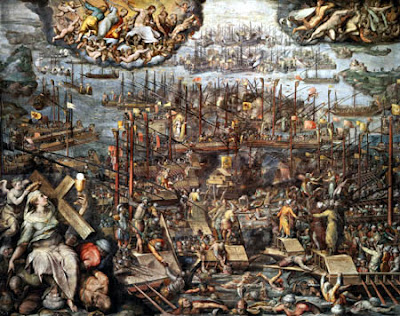From Mundabor's Blog
 |
| Giorgio Vasari - Battle of Lepanto |
The battle proved such a stunning victory that the Ottomans never regained their former supremacy on the Mediterranean. Interestingly, this was due not to the difficulty or cost of replacing the material (the Ottoman suffered an almost annihilation of their fleet but with a huge effort had their fleet completely rebuilt in around a year), but in the impossibility of recreating an entire generation of skilled soldier and archers, whose training was extremely long and expensive and whose ranks suffered extremely heavy losses during the battle.
The Ottomans lost not only 210 of their 240 vessels, but between 15,000 and 30,000 soldiers or sailors. The Holy league’s losses were limited to the loss of 7,500 soldiers and sailors (but with the liberation of around the same number in Christian prisoners enslaved as oarsmen in the Ottoman fleet) and the loss of merely 20 vessels in battle, plus further 30 that had to be scuttled.
Together with the two sieges of Vienna (I have written about the second one here), the battle of Lepanto constitutes one of the most dramatic – and perhaps the most glorious – page in the history of the brave fight of Christianity against the Ottomans. The fact that at the time of the second siege of Vienna (more than one century later) the Ottomans were still at the height of their power on land but had never managed to regain supremacy on the sea gives you an idea of the extent of the defeat and of the trauma it caused among the Ottomans.
The Holy League stood under the protection of the Blessed Virgin, with a huge Rosary procession celebrated in Rome on the day which turned out to be the same one of the battle. Andrea Doria, the commander of the Venice Fleet, had in his room a portrait of Our Lady of Guadalupe.
After the spectacular victory, the great Pope St. Pius V instituted the Feast of Our Lady of Victory to commemorate the event. The name of the feast was changed a couple of times and it is now Our Lady of the Rosary.
The 7th October is a great day for Christianity. All too easily we forget that even if these events now belong to a remote past, the consequences of they turning out differently would be still felt today. Who knows whether – in that case – your truly would be here today, writing a Christian blog.
The Rosary is an extremely powerful weapon. We should remember it more often in our daily life, facing the enemies of abortion, divorce, homosexuality, aggressive atheism, and heresy in general. Those who wish it may find additional information about the Rosary here.
Mundabor
No comments:
Post a Comment
Comments are subject to deletion if they are not germane. I have no problem with a bit of colourful language, but blasphemy or depraved profanity will not be allowed. Attacks on the Catholic Faith will not be tolerated. Comments will be deleted that are republican (Yanks! Note the lower case 'r'!), attacks on the legitimacy of Pope Leo XIV as the Vicar of Christ, the legitimacy of the House of Windsor or of the claims of the Elder Line of the House of France, or attacks on the legitimacy of any of the currently ruling Houses of Europe.